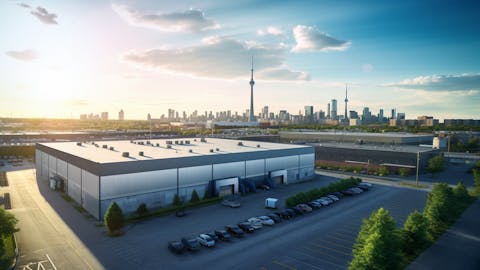Jeff Witherell: Hey, Nick, this is Jeff. I think we talked about this last year as well, where what we were seeing were tenants, yes, taking their time on actually signing the lease, right. So they negotiate the terms and then it’s out the signature and they’re sitting on it for 30, 45 days. And what we believe that to be is once they have that negotiated, they go out into the marketplace and try to find a better deal, let’s say, or test the market to see where things are. And so when you’re talking about our size space, if you need 50,000 square feet in one of our markets, there are probably not ten availabilities for that. And so what we’ve just seen is people taking their time on that. I don’t know if Jim can add to that.
Jim Connolly: Yeah, that’s been a trend that’s been going on for the past year. Another thing that’s going on is the larger logistics companies are all doing studies on where they want to be in the future, and it’s across the board. Like, for instance, Maersk won’t sign leases longer than four months right now, but we got them to sign a nine month lease, which is great. And it’s just because they’re trying to gauge what their business is going to be like in the future. So it’s not just that they’re fishing for better deals that they’re also try to maximize and get in the right spot.
Nick Thillman: Very helpful. That’s it for me. Thanks.
Jeff Witherell: Thanks.
Operator: Our next question will go from Mitch Germain with Citizens JMP. You may now go ahead. Pardon me, Mitch, your line may be muted.
Mitch Germain: Sorry about that. Jeff, I know you talked about match funding, or at least match only a portion of potential acquisitions, but I’m curious if you talked about some sellers or some buyers emerging and some activity in the investment sales market, is there potential for you to do some just opportunistic dispositions, assets that may not fit the long-term growth profile or may have some sort of leasing issue to address in the future?
Jeff Witherell: Yeah, Mitch, I think we kind of covered some of these things in the past. We have two or three buildings right now that are ready for sale. I think we’ve mentioned we want to exit the Kansas City market. I don’t want to talk about our 50,000 square foot building in Milwaukee anymore, so we’re selling that as well. And I think you see the sale that’s being put to us by the tenant is going to bring in some proceeds. So on top of that, we’re always evaluating buildings that don’t quite fit. I hate to say too much on an open line about it, because buyers are listening potentially, but we’re always looking to prune assets that don’t fit kind of a round building. When the markets are hot, you want to sell a round building and keep the rectangles.
Mitch Germain: Gotcha. That’s helpful. Are there any other purchase options in the portfolio, or is this kind of like a one off item?
Jim Connolly: We would consider this a one off item. There are a diminutive amount of purchase options in in-place leases that, based on our evaluation, are unlikely to be exercised.
Mitch Germain: Okay, that’s super helpful. Last for me, I’m curious about lease structure. I know you’ve talked a little bit about a little bit longer to execute, but I’m curious about structure. Are you getting any pushback on term or escalators kind of in this new environment, or are you still kind of able to push some of the kind of wants when you’re discussing leases with tenants?
Jeff Witherell: So at the start of the year, it seemed like it was going to go that way, that there was going to be a lot of pushback. But it seems to have changed over the last month and a half where we’re seeing significant rent increases term five plus years, and a lot of people want to renew early. It’s just changed over the last month.
Mitch Germain: Great. Thank you so much.
Jeff Witherell: Thanks, Mitch.
Operator: Our next question will come from Bryan Maher with B. Riley FBR. You may now go ahead.
Bryan Maher: Great. Thank you and good morning. I was wondering if you could comment a little bit more on your thoughts on the Golden Triangle, and you put front and center on your prepared comments released last night the Honda and Toyota announcements. Can you give us maybe a little bit more color on how you think that and maybe other opportunities over the next year or two are going to impact the Golden Triangle and kind of more specifically you?
Jeff Witherell: Hey, Bryan. We put so much detail out there on the Golden Triangle, and we try to add a lot more to it. I mean, those are the markets that we’re primarily in. That’s the markets where we’re going to continue to focus on. And based on all the data that we put out there, we believe this phenomenon is here to stay. Basically every week there’s new announcements. There’s been some fantastic information put out for Harry Moser, as we referenced in the prepared documentation. So how we benefit is being in markets like Memphis, St. Louis, I mean, Chicago. I mean, I think one of the big things we pointed out was Honda in Canada is really getting set up for setting up in Canada and being able to bring their product down into the United States.
So if they’re going to come down into the United States, they’re probably going to come right down into Chicago and distribute. And a big part of Memphis is bringing the product up from Texas into places like St. Louis and getting it distributed. You need infrastructure for that. So how we benefit is being in places like Chicago, where you have the lowest transportation cost in the country because you have the infrastructure and you have the employment base. So all of these things are really what is going to drive the future of onshoring and reshoring is going to be the infrastructure. I mean, I think we talked about it last time, in order to secure a fairly significant lease in our new building in Georgia, we needed to negotiate a contract with Georgia Power, which we did.

